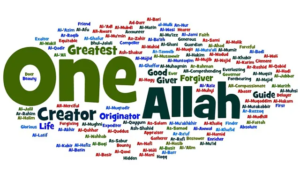
What is the meaning of shirk?
Ulama Institute #1
Looking to learn Arabic or memorize the Quran?
Check our Trusted Teachers

Linguistically the word shirk in the Arabic language refers to the meaning of <sharing>. From this origin comes the term “sharakah” which means partnership. But the term shirk, in the context of the Qur’aan and the Sunnah is attributing a partner to Allah ﷻ and directing any form of worship to other than Him.
Shirk is one of the most dangerous sins that an individual can commit because Allah has mentioned that He will not forgive the person who dies without having repented from shirk. Allah ﷻ says:
إِنَّ ٱللَّهَ لَا يَغْفِرُ أَن يُشْرَكَ بِهِۦ وَيَغْفِرُ مَا دُونَ ذَٰلِكَ لِمَن يَشَآءُ ۚ وَمَن يُشْرِكْ بِٱللَّهِ فَقَدِ ٱفْتَرَىٰٓ إِثْمًا عَظِيمًا ( سورة النساء : ٤٨ )
“Indeed, Allah does not forgive the one who commits shirk with Him, but He forgives whatever is less than that for whomever He wills. And whoever associates others with Allah has certainly fabricated a tremendous sin.” ( soorat an- nisa : 48)
The first people known to commit shirk were the people of Nooh . During the period between Adams and Nooh, there existed some righteous men well-known for their piety. After their deaths, iblees inspired the people to erect monuments and statues commemorating the lives of these righteous men. After the passage of time and the coming of a new generation, the people forgot why the statues were erected and iblees inspired the people to worship them. So Allah ﷻ sent Nooh with the message of Tawheed.
From the time of Nooh until the coming of the Prophet Muhammad, Allah has sent every Prophet and Messenger with the responsibility of calling people to Tawheed and warning them against the consequences of shirk. Allah ﷻ says in His Book:
وَلَقَدْ بَعَثْنَا فِى كُلِّ أُمَّةٍۢ رَّسُولًا أَنِ ٱعْبُدُوا۟ ٱللَّهَ وَٱجْتَنِبُوا۟ ٱلطَّـٰغُوتَ ۖ( سورة النحل : ٣٦ )
“And We certainly sent into every nation a messenger, [saying], “Worship Allah and avoid Taghoot.” (Soorat an-Nahl : 36)
And He says:
وَمَآ أَرْسَلْنَا مِن قَبْلِكَ مِن رَّسُولٍ إِلَّا نُوحِىٓ إِلَيْهِ أَنَّهُۥ لَآ إِلَـٰهَ إِلَّآ أَنَا۠ فَٱعْبُدُونِ ( سورة الأنبياء : ٢٥ )
“And We sent not before you any messenger except that We revealed to him that, “There is no deity except Me, so worship Me. (Soorat al-Anbiya: 25)
From the story of Nooh and his people we understand the danger of raising people beyond their status. This is why Allah ﷻ criticizes the People of the Book concerning their exaggeration of ‘Eesa as Allah mentions:
يَـٰٓأَهْلَ ٱلْكِتَـٰبِ لَا تَغْلُوا۟ فِى دِينِكُمْ وَلَا تَقُولُوا۟ عَلَى ٱللَّهِ إِلَّا ٱلْحَقَّ ۚ إِنَّمَا ٱلْمَسِيحُ عِيسَى ٱبْنُ مَرْيَمَ رَسُولُ ٱللَّهِ وَكَلِمَتُهُۥٓ أَلْقَىٰهَآ إِلَىٰ مَرْيَمَ وَرُوحٌۭ مِّنْهُ ۖ فَـَٔامِنُوا۟ بِٱللَّهِ وَرُسُلِهِۦ ۖ وَلَا تَقُولُوا۟ ثَلَـٰثَةٌ ۚ ٱنتَهُوا۟ خَيْرًۭا لَّكُمْ ۚ إِنَّمَا ٱللَّهُ إِلَـٰهٌۭ وَٰحِدٌۭ ۖ سُبْحَـٰنَهُۥٓ أَن يَكُونَ لَهُۥ وَلَدٌۭ ۘ لَّهُۥ مَا فِى ٱلسَّمَـٰوَٰتِ وَمَا فِى ٱلْأَرْضِ ۗ وَكَفَىٰ بِٱللَّهِ وَكِيلًۭا ( سورة النساء : ١٧١ )
“O People of the Scripture, do not commit excess in your religion or say about Allah except the truth. The Messiah, Jesus, the son of Mary, was but a messenger of Allah and His word which He directed to Mary and a soul [created at a command] from Him. So believe in Allah and His messengers. And do not say, “Three”; desist – it is better for you. Indeed, Allah is but one God. Exalted is He above having a son. To Him belongs whatever is in the heavens and whatever is on the earth. And sufficient is Allah as Disposer of affairs. (Soort an-Nisa: 171)
Raising the status of people beyond what is acceptable is not a problem that only affects the People of the Book. Some Muslims also exaggerate the status of people. This type of exaggeration may lead to shirk since it can lead a person to seek the assistance of people in affairs that are specific to only Allah ﷻ .
Learning from the lesson
- Shirk means to direct any form of worship to other than Allah ﷻ.
- Allah will not forgive the person who dies without having repented from shirk.
- Allah has sent every Prophet and Messenger with the responsibility of calling people to Tawheed and warning them against the consequences of shirk.







